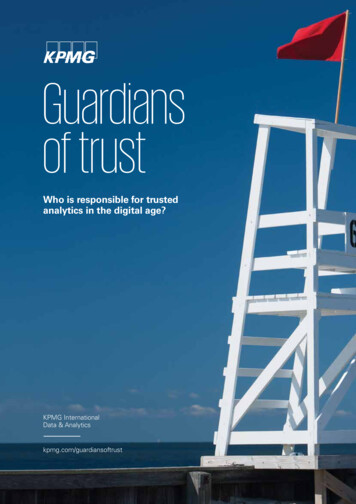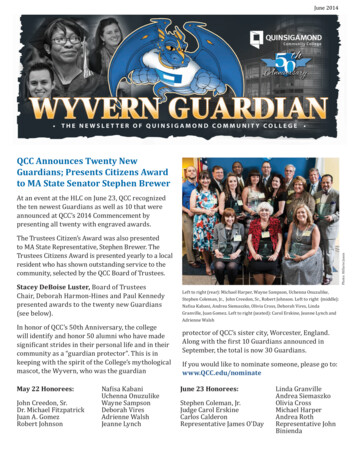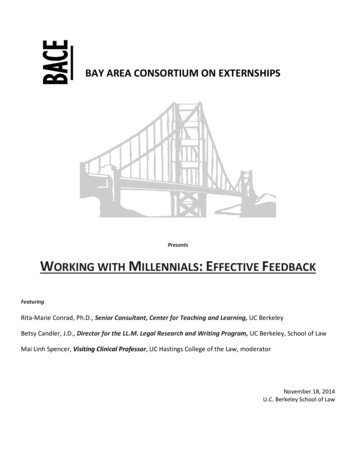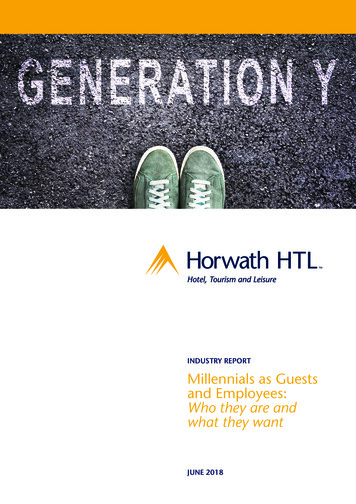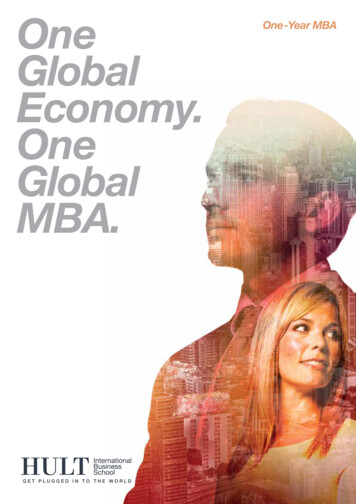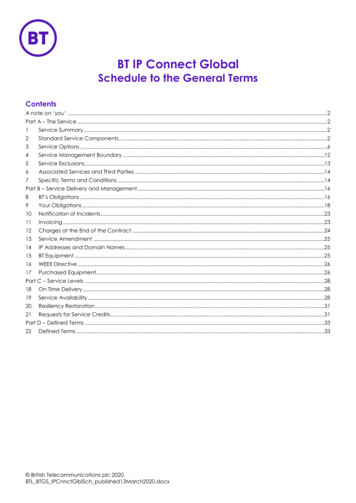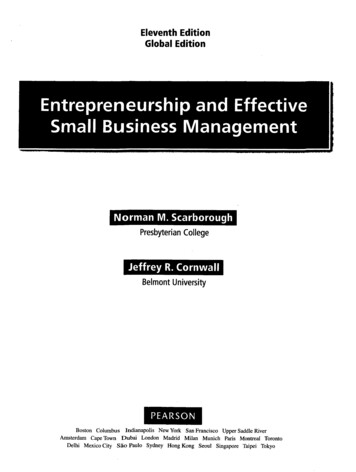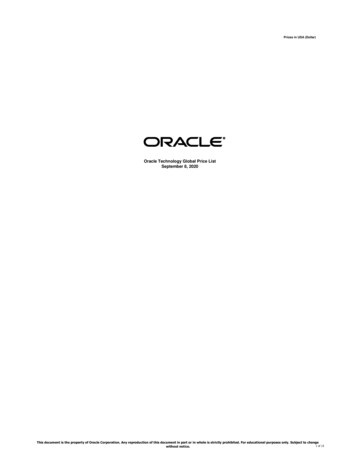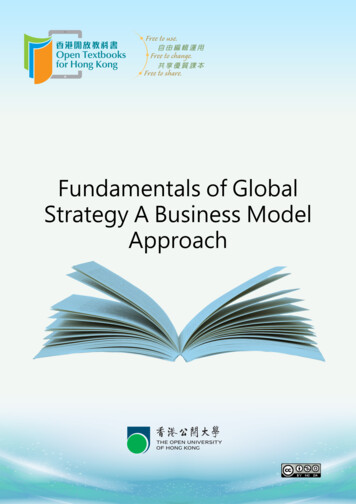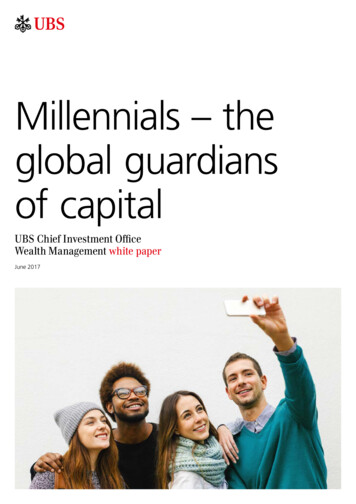
Transcription
Millennials – theglobal guardiansof capitalUBS Chief Investment OfficeWealth Management white paperJune 2017
ContentsP. 51. Why millennialsmatter.2. Who are these millenni‑als. and who are they not?P. 113. Technology is impactingexpectations and behaviorsacross generations.P. 174. Demand for using privatewealth for public good is alsorising across generations.P. 27P. 33Appendix
ForewordDear reader,The financial, economic and sociopolitical prominence of the “millennial” generation is continuingto grow at a rapid pace. Those born between 1982 and 1998 already account for 27% of the globalpopulation. Today they hold USD 17trn of the world’s private wealth, and by 2020, that could rise ashigh as USD 24trn — or roughly 1.5 times the US’s national output in 2015. Looking further ahead,millennials are set to control an even greater share of global wealth, as they are positioned to benefitfrom one of the largest intergenerational wealth transfers in history.In this white paper, UBS CIO WM explores the ways that the millennial generation is different, andhow the impending shift of economic power will significantly influence their expectations andpotential compared to prior generations. The paper specifically highlights three characteristics thatset millennials apart from those that came before them.First, millennials are digital natives that have grown up in a world of automation and connectivity.This high fluency with technology means millennials demand ever more digital services, and acceler‑ating adoption rates imply that new innovations are already spreading quickly across generations.Second, millennials call for a wide choice of content, conveniently delivered, that meets their variedaffinities and needs. The choice, social connections, and convenience of a platform-company modelappeal to millennials today and will spread to other generations as technologies diffuse.And finally, millennials seem increasingly aware of global problems and their potential solutions, astechnology broadens their circle of social connections. A broadly held desire for purpose means theyare particularly willing to use their private capital for the public good, and will be ever more able todo so as wealth passes down to them.Stakeholders who respond to these trends will unlock wider opportunities, especially as other gener‑ations follow millennials’ lead. Businesses should embrace digital, multichannel service provisionalongside their traditional operating models, making choice possible through a preferred mode ofdelivery that suits each client’s tastes. Similarly, corporations, governments, and non-governmentalorganizations should collaborate to build communities and networks that link people, products, andinformation – something that is particularly relevant for those who seek a greater purpose and whowant to use their financial and human capital to have a positive social impact.No stakeholder can afford to ignore the millennial generation, nor can they allow themselves to makefalse assumptions based on ill-informed stereotypes or near-sighted typecasting. Instead, there must bea widespread adaptation to meet the needs of these next guardians of global capital, to embracethe technological changes that define their demands and to evolve in ways that help transform ourworld for the better.Thank you for taking the time to read about this important topic.Tom NaratilPresident WealthManagement Americasand President AmericasMillennials – the global guardians of capitalJürg ZeltnerPresident WealthManagement3
1.Why millennialsmatter.“Millennial” is the term used to de‑fine a cohort of people that came ofage at the turn of the 21st century.They are set to benefit from the big‑gest wealth transfer ever seen, war‑ranting research that examines theirexpected demands.We observe that millennials haveparticular traits that differ from othergenerations. They particularly favorconvenience, multi-channel commu‑nication, and transparency frombusinesses (and wealth managers).By 2020, global millennial wealthcould stand at USD 24trn, aroundone-and-a-half times the size of thewhole US economy in 2015. In‑heritance, entrepreneurial activities,and income growth could powerthis wealth accumulation.5
1.Why millennialsmatter.In 1991 a word was born. American authors Neil Howeand William Strauss created “millennials,” to label a genera‑tion of Americans whose oldest members would come ofage at the turn of the second millennium. Definitions formillennials abound. A common one for this group (alsoknown as “Generation Y”) is those born between 19821998 (ages 19–35 years today), and this is what we use inthis white paper. For context, millennials are preceded by“Generation X” (aged 36–51 years) and has parents in thegeneration before that, the “Baby Boomers,” who wereborn in the immediate aftermath of the Second World Warand are aged between 52 and 70 years old today.Measuring the millennial opportunityBusinesses, governments, and other organizations are intenton trying to understand this whole “generation” of people.Why? Arguably the main reason is that millennials alreadycontrol significant levels of wealth and are expected tocommand even more over the coming years and decades.Millennials were already estimated to control USD 16.9trnof wealth in 2015 (according to Business Insider UK’s reportof Boston Consulting Group analysis), though the share ofmillennial-managed wealth across regions differs consider‑ably, from just 5% in North America to 16% in Asia Pacific(ex Japan).Looking ahead, this generation looks set to benefit fromone of the largest intergenerational wealth transfers ever,carried out over a comparatively short timeframe. Even by2020, the total net worth of global millennials is expectedto grow to USD 19–24trn, according to data in Deloitte’s2015 edition of Insights. The 2016 Billionaires report fromUBS and PwC estimates that 460 billionaires will hand overUSD 2.1 trillion over the next two decades, a sum equal toIndia’s entire gross domestic product in 2015. And BabyBoomers are expected to pass down around USD 30 trillionbetween 2011 and 2050 in North America alone, as quotedin a 2015 study by Accenture.Entrepreneurship may also lead to further millennial wealthaccumulation. Members of this cohort started their firstbusinesses eight years sooner, launched twice as many busi‑nesses, and targeted gross profit margins more than 30percentage points higher than their parents’ Baby Boomergeneration, according to a 2016 report on global entrepre‑neurship by BNP Paribas and Scorpio Partnership.Last, the oldest members of the millennial generation areon the cusp of moving into their peak labor income, spend‑ing, and investment years as they advance professionally.This generation, expected to account for three-quarters ofMillennials – the global guardians of capital6
1. Why millennials matter.the global workforce by 2025, is forecast to enjoy a neardoubling in its gross income by 2030. Earning powershould rise to USD 32trn from USD 18.4trn in 2015, accord‑ing to analysis from Bank of America Merrill Lynch, basedon Euromonitor data. And in Asia Pacific, the millennialgeneration is expected to have the largest spending powerof any generation ever, with an estimated disposable in‑come of USD 6trn by 2020 according to September 2016data from Accenture.In consequence, it is critical that institutions adapt to theneeds of these new guardians of capital. A first step inmaking changes would be to understand millennial tastesand behaviors, comparing those to other age groups inorder to establish any observable differences.Fig.1 – Millennials’ existing wealth is already sizableTotal millennial wealth (trillions of USD in NorthAmerica1.91.20.60.5JapanMiddle Eastand AfricaLatinAmericaEasternEuropeGlobalSource: Business Insider UK, based on BCG Global Wealth Market-Sizing Database, 2016 and BCG analysis.URL: g-boston-consulting-group-2016-6?r US&IR T,accessed 26 May 2017.Millennials – the global guardians of capital7
1. Why millennials matter.Millennial tastes are differentEvidence suggests that millennials have some characteristictastes that are different to former generations. Looking atdata on millennial behaviors across industries, includingfinancial services, we find that this generation places particu‑larly high emphasis on three qualities: convenience, multichannel delivery, and transparency.ConvenienceThe millennial generation wants convenient, on-demandaccess to goods and services. This age group dominatesthe US on-demand economy, which includes online marketplaces, transportation, and food shopping conducted on theInternet. Millennials accounted for 49% of all on-demandconsumers in the US in 2015, compared to 22% aged 55 orolder, according to a Harvard Business Review report basedupon the National Technology Readiness Survey (RockbridgeAssociates and A. Parasuraman). Millennials also seem toplace a particularly high value on their time and efficientuse of it, even when it comes to issues such as their ownhealth. Some 49% of US millennials prefer interactionswith healthcare providers that are “fast, convenient, or in‑stantaneous,” compared to 40% of Generation Xers and28% of Baby Boomers (according to a 2016 report Insightsinto the Millennial Market from WebMD Health Services).Multi-channel deliveryIn contrast to other generations, millennials prefer to en‑gage with companies and purchase their products using avariety of channels. They value digital communication andsocial media as a means to be inspired, compare prices, andselect goods and services. In 2014, 47% of millennial con‑sumers used social media as part of their shopping experi‑ence versus 19% of non-millennials, according to DeloitteDigital (Navigating the New Digital Divide, 2015). Yet theycombine this digital interaction with in-store collectionmore frequently than other age cohorts – 19% of millennialsbought their shopping basket online and then collected thegoods or services in store, versus 12% of non-millennialsaccording to the same survey.They also appear to be embracing convenient, multi-channeldelivery of financial services that is both traditional anddigital. Based on a 2016 consumer survey undertaken byMcKinsey, millennials transact business with their principalbank 52 times a year via internet banking, compared to42 times a year for Baby Boomers, while having more thandouble the number of mobile banking touch points (48versus 19). However, millennials also visit branches nearlytwice as often as Baby Boomers (29 times against 16 timesrespectively), and engage with a broker or agent threetimes as often as Boomers.This desire for greater convenience than other generationsextends to financial services too – 69% of UK millennialswould like to use their mobile phone as a replacement to aphysical card for point-of-sale transactions, versus 40% ofBaby Boomers that want the same, according to a 2016consumer survey undertaken by McKinsey. Millennials aremore than twice as likely as Baby Boomers to demand amobile banking service that allows for financial advice tobe delivered by in-app chat or via video conference, basedon data from the same survey.Millennials – the global guardians of capital8
1. Why millennials matter.TransparencyMillennials show a higher propensity than other generationsto be transparent and share personal information if doingso gives them an advantage such as a financial or experien‑tial incentive, or if service is thereby more personal. On thispoint, 23% of millennials would be willing to share their cellphone number, 21% their purchase history, and 15% theirhousehold income (compared to 11%, 12%, and 6% respec‑tively for Baby Boomers), based on data from an October2015 study conducted by the University of Columbia Busi‑ness School and Aimia (What is the Future of Data Sharing?Consumer Mindsets and the Power of Brands).In financial services, millennials are willing to forego privacymore so than other generations, if sharing personal datagives them a more convenient or more personal service.57% of millennials would use biometric identification fortheir mobile-banking log-in, more than 20 percentagepoints more than Baby Boomers according to McKinsey. Fur‑thermore, 57% of millennials would be prepared to sharedetails of their savings target with family and friends, per‑ceiving that doing so would allow trusted individuals to offermore tailored advice on how to achieve their goals. Incontrast, just 32% of surveyed Baby Boomers would be pre‑pared to divulge the same information.To explore further go to:ubs.com/millennialswww.Millennials – the global guardians of capitalwww.9w
2.Who are thesemillennials and who arethey not?Researchers have attempted to gen‑eralize about millennial behaviors.They have risked alienating this di‑verse group by overlooking widertrends that will affect everyone.In fact, millennials’ ability to adoptnew technologies and willingness totackle global issues will drive broadershifts in demand across age groups,compelling stakeholders to respondwith new, innovative operatingmodels.The assumptions that millennials areobsessed with technology and them‑selves, to their own detriment, donot conform to the facts. All agegroups rely increasingly on technol‑ogy and are aware of the world’seconomic and social imbalances.
2.Who are thesemillennials and who arethey not?Observed behaviors and traits suggest that millennials de‑mand greater convenience and access to a wider range ofcommunication channels, while exhibiting a high degreeof transparency in supplying personal data to organizations.Assumption 1:Millennials are obsessed with technology,at considerable cost.Researchers have sought to scale up from micro evidenceto the macro level. A vast body of research has sought toexamine not just how millennials behave, but who thesemillennials are.Purported side-effects of the millennial generation’s ob‑session and exposure to technology are shorter attentionspans, and a culture of “instant gratification.” In 2015,almost nine in 10 US millennials checked their mobile devic‑es within a quarter hour of waking according to a studyin Deloitte’s 2015 edition of Insights. One conclusion is thatmillennials’ relationship with technology is a uniquely un‑healthy one that threatens their ability to make long-term in‑vestments in their careers, education, and personal passions.Two key assumptions about the millennial cohort stand outin particular:Millennials – the global guardians of capital12
2. Who are these millennials and who are they not?Assumption 2:Millennials are more narcissistic and selfishthan other generations.Fact 1:Everyone depends on technology to anincreasing extent.Commentators frequently pin the label of narcissism, entitle‑ment, or self-interest on millennials. The cohort is allegedto attach more importance than other generations to selfishconcerns (money, social status, fame) over community orcivic ones. Studies by Jean Twenge and others of US collegestudents over the past four decades concluded that millen‑nial generations showed an elevated sense of egotism,self-esteem, and expectations about their future prospects.For example, US millennials scored lower than GenerationXers and Baby Boomers on 11 and 13 measures of civic ori‑entation and social capital respectively, such as thinkingabout social problems (Twenge, Campbell, and Freeman(2012)).The millennial generation is the first to have grown up insmartphone-connected, technology-rich households. Theyare most fluent in using the Internet and online networksto learn, conduct business, and live. Mark Prensky describessuch people as “digital natives” and those who had topick up technological proficiency later on in life as “digitalimmigrants.”We would argue that both of these assumptions are dis‑putable. In short, we find that millennials are neither tech‑nology-obsessed in comparison to other age groups, noruniquely self-centered compared to other people. We willshow, in parts 3 and 4 of this white paper, that millennialsexhibit an affinity toward embracing technological progress.Technology has raised millennial awareness of the world’sgrave problems and of how these international problemsaffect their generation as the definition of community ex‑tends from local and national scales to the global level.This generation also shows a willingness to tackle unsus‑tainable growth with sustainable, private capital solutions.It is clear that millennials rely heavily on technology, but wewould argue that everyone does today. Almost nine in 10millennials checked their devices with 15 minutes of wakingin 2015. A year later, this behavior had spread across allage groups, with Deloitte’s Global Mobile Consumer Survey2016 study finding that six in 10 people, regardless of age,checked their digital devices within a quarter hour of wak‑ing. Additionally, evidence suggests that while “millennial”reliance on digital communication is higher than other gen‑erations, other age groups also attach a great deal of im‑portance to having constant connectivity. A 2016 Comm‑scope study of 4,000 people from San Francisco, Sao Paulo,London, and Hong Kong found that 74% of millennialssaid that they could not survive one full day without theirsmartphone – this compared to a smaller (but still significant)proportion of Baby Boomers – 50% – that said they couldnot survive a single day without their device.One criticism of “millennials” is that instant access to infor‑mation and social connections in a world of extreme con‑nectivity had nurtured this culture of “instant gratification”and shortening attention spans. A more digital lifestyle hasbeen ascribed as a reason for declines in the average hu‑man attention span across all age cohorts, from around 12seconds in 2000 to eight seconds in 2013, according to aMillennials – the global guardians of capital13
2. Who are these millennials and who are they not?survey of 2,000 participants by Microsoft Canada. By wayof comparison, a goldfish is thought to be able to fix itsthoughts for nine seconds.However, we would argue that all age cohorts are increas‑ingly shifting to on-demand services and will alternate theirfocus between multiple tasks. This trend across age groupsstems, in part, from technological advancements and speed‑ier adoption of technologies for everyone. We explore theimpacts of technology and the business model implicationsin part 3 of this white paperFact 2:Millennials are no more selfish than priorgenerations of young people – they mayeven be more socially aware.We identify several reasons to refute the view that theunder-35 age group is more “Generation Me” than “Gen‑eration We” compared to prior cohorts.First, criticism of younger generations as being more selfishor self-centered is a historical phenomenon, not just limitedto today. The idea of the “Me Generation” applied by TomWolfe to US Baby Boomers in the 1970s sounds strikinglyfamiliar to the concept of “Generation Me” assigned tomillennials in 2013.Second, psychological studies suggest that self-centeredbehavior is no more prevalent in today’s youth than in othercohorts. A comprehensive study of near 500,000 US highschool seniors between 1976 and 2006, conducted byTrzesniewski and Donnellan (2010), found little statisticallysignificant evidence that today’s millennials were more self‑ish, individualistic, or antisocial.To explore further go to:ubs.com/millennialswww.www.ww w.On the contrary, a greater proportion of under-35s thinkcarefully about the impact of their actions on other people.The under-35 age group believes that businesses in whichthey invest, whether as employees or with financial capital,have wider responsibilities than simply making profit.According to Deloitte’s 2016 survey of “millennials,” 87%of this group believes that corporate success should bemeasured in more
President Wealth Management . (Rockbridge Associates and A. Parasuraman). Millennials also seem to place a particularly high value on their time and efficient use of it, even when it comes to issues such as their o
